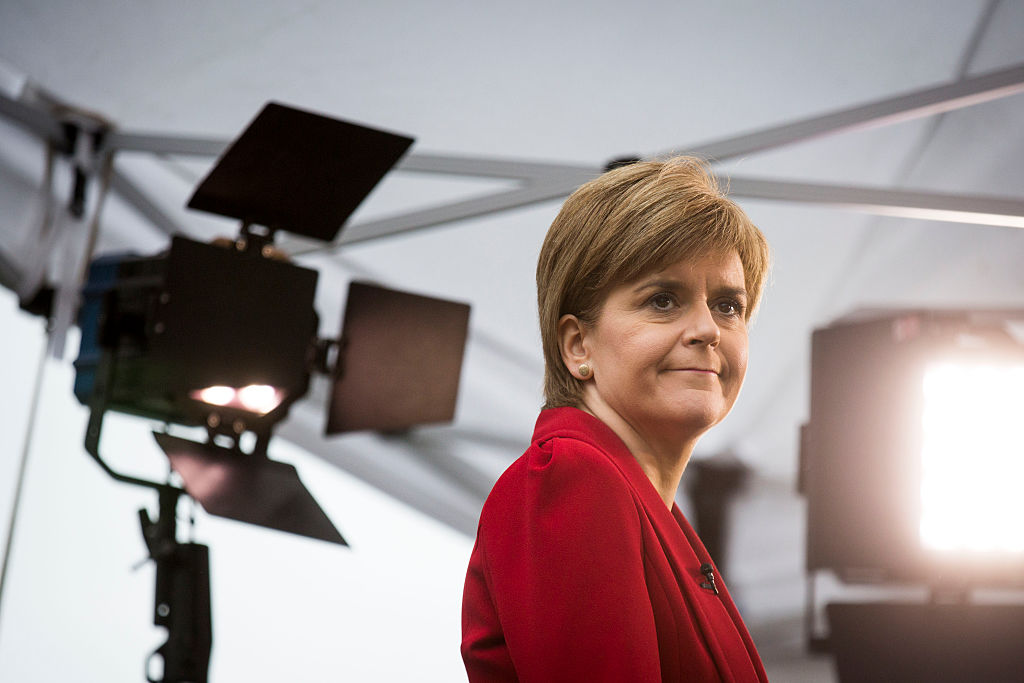Nicola Sturgeon’s valedictory address to the RSA was her ‘And now we turn to the liars…’ speech. The outgoing SNP leader’s remarks were nominally about inequality and climate change but she was really there to talk about the distorting impact of social media on democratic politics. Given her departure was possibly hastened by the pushback against her Gender Recognition Reform Bill, which saw women’s rights campaigners and others organise via social media, it’s understandable that the First Minister would feel a little irked by these disruptively democratic platforms.
The ‘nature of the discourse’, Sturgeon opined, was ‘undermining our ability… to address the big issues’. The ‘damage’ social media was doing to democracy globally was outweighing the benefits. This is the new orthodoxy among political elites, who have gone from gushing over the opportunities of digital democracy and open societies to fretting that such things have become rather too democratic and too open.
Indeed, Sturgeon prayed in aid of Tony Blair’s description of social media as a ‘plague’ on democracy, which she said was ‘the reality right now’. Algorithms ‘obliterate nuance’ and ‘force us into binary positions’ and with the distinction between fact and opinion having broken down, finding common ground was ‘much, much harder’. This had led politicians to think ‘extreme positions’ were the majority view when they were not. Then there was ‘the abuse that is hurled at anyone who puts their head above the parapet’.
All well and good but one question: why was Sturgeon, who is still First Minister for the next seven days, down in London giving this speech?
There’s no gentle way to say this but the reason Sturgeon prefers to give speeches and interviews in London is because no one in London knows anything. At least not anything about Scotland, though Sturgeon’s little digs at Brexit elicited the sort of titters you would expect to hear on The Strand about the voting habits of people in the Midlands.
Whether it’s London TV presenters, columnists, think tankers or arts and third-sector types, there is a knowledge gap that always shows in public encounters with Sturgeon. This ignorance encourages assumptions that are wildly at variance with reality. To a certain sort of London opinion-former, Sturgeon is a more progressive, less buttoned up version of a frontbench Labour politician. She’s what Yvette Cooper or Rachel Reeves would be if Daily Express readers didn’t have the vote.
But that is not what Sturgeon is. Sturgeon is a master triangulator. She makes Bill Clinton look ideological. She makes Tony Blair sound sincere. She has sustained herself through seven years as deputy First Minister and another eight in the top job itself by constant and carefully calibrated positioning and reinvention. She was the populist champion of the NHS then the tough-minded axewoman who cut student nursing places, the patients’ rights champion whose ‘legally binding’ treatment time guarantee has not been enforced, legally or otherwise. She was the Brexit-basher who campaigned wanly for Remain then prevaricated on a People’s Vote.
When time came to court the votes of Labour supporters, she dropped long-standing low-tax policies and declared closing the poverty-related attainment gap her ‘defining mission’. Tax inched up, generated less revenue than expected, and the attainment gap remains. Then she went from a defender of North Sea oil and gas to a passionate climate warrior, the Greta Thunberg of Generation X. A veteran gradualist on the constitution, her grassroots grew impatient over the failure to deliver independence, and suddenly Sturgeon was for a unilateral referendum, a scheme which met an abrupt end before the Supreme Court.
Sturgeon is more comfortable with a London interviewer before a London audience because neither is likely to be familiar with her political trajectory. Of course some will be aware of difficulties with education, health and drugs deaths but beyond that it will be fuzzy. Certainly, her preferred audience won’t be aware that the Sturgeon who complains of divisive demagoguery likes to tell Scotland it is ‘treated like something on the sole of Westminster’s shoe’. That the Sturgeon who laments Brexit populism raised the prospect of EU citizens losing the right to remain in Scotland when the European Commission wasn’t playing ball during the independence referendum. That the Sturgeon who declaims the Home Office’s treatment of refugees has been keeping Ukrainians on boats docked in Glasgow and Edinburgh.
They certainly won’t be aware that the Sturgeon who complains about the coarsening effect of social media, intemperate rhetoric and intolerance in politics heads a party whose online supporters, dubbed cybernats, poured years and barrelfuls of invective into making Scottish political discourse a byword for bile, hatred and impugning the patriotism of half the country. (Frontline SNP politicians only got serious about the problem when some of the cybernats started coming for them.)
Sturgeon’s perspective on inequality and climate change – these are twin threats and can only be solved in tandem – is indistinguishable from the corporate position of your average NGO or UN agency. That’s not to say she’s wrong, merely that there was nothing in her remarks that was original or thought-provoking or inspired. Sturgeon is making the sort of speech you make when you stand down as a head of government and want to get your name out there among international foundations and institutions. The kind that use phrases like ‘global leadership’ and ‘people-centred dialogue’ and like to hire former politicians to repeat these phrases at mountain resorts, in conferences attended by other former politicians, the occasional rock star and, invariably, Henry Kissinger.
Who knows what Nicola Sturgeon has planned for the future but, on the strength of the high-status bromides she offered today, she would fit right in with the NGO jet set.







Comments